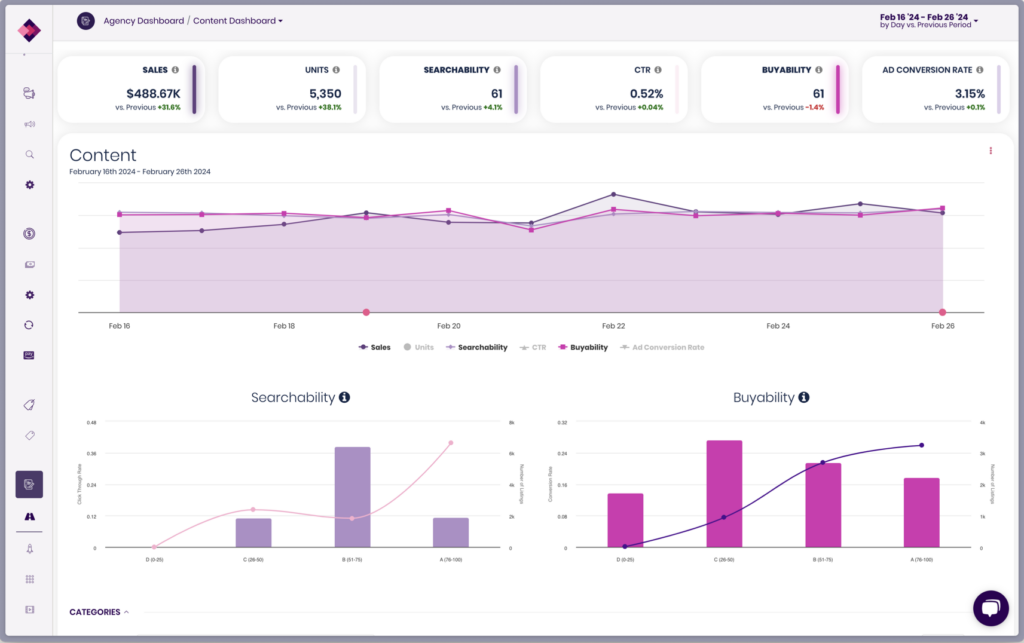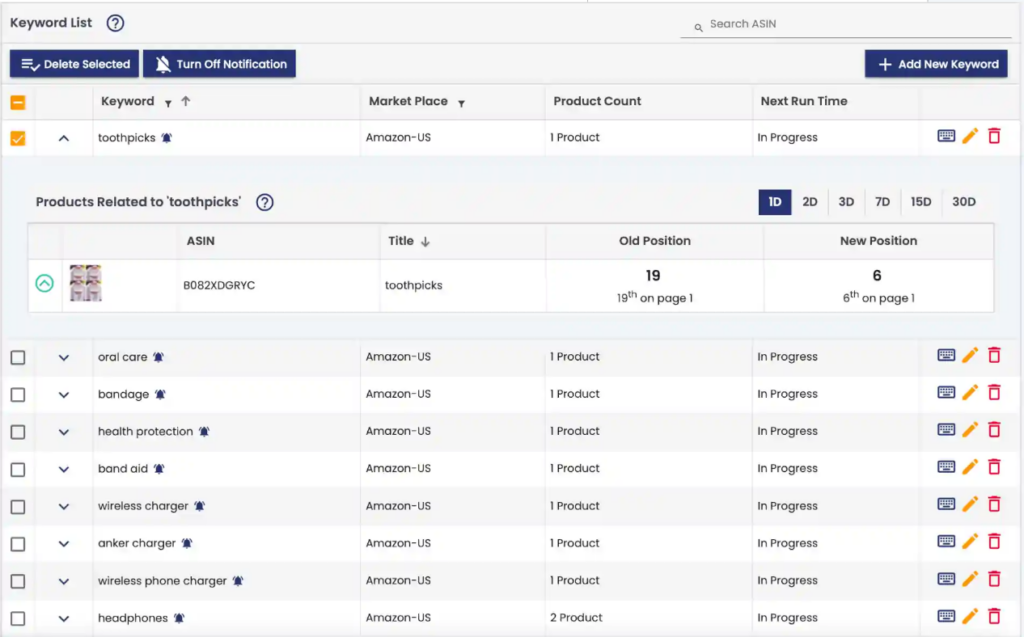When it comes to getting eyes on your products, leveraging the right keywords can mean the difference between ending up on the first page of search results or your competition taking the top spot. Picking the perfect terms and phrases to associate with your products takes time, technique, and the right tool to lend a hand. In this post, we’ll explore the best Amazon seller tools available so you can keep an eye on how your keywords are ranking.
9 Best Amazon Keyword Rank Tracking Tools
Keyword ranking tools come in plenty of shapes and sizes, but most center on the same basic function: helping you assess the performance of your chosen keywords. These are nine of the best Amazon FBA software resources for rank tracking available to help you grow your business.
1. Trellis

When you want to ensure your keyword use is on point, from integrating the best words and phrases throughout product content to leveraging them for paid campaigns, Trellis leads the way. Keyword analysis plays a role in a big-picture approach to eCommerce, including developing SEO strategies to optimize everything from ad spend to conversion rates.
The Trellis platform goes above and beyond, leveraging AI to transform basic metrics into strategic approaches. The software also offers access to an extensive array of customizable reports, including search terms, keyword performance, and category and product details.
In addition to offering resources that extend beyond simple rank tracking, Trellis also breaks the mold in eCommerce KPIs with an innovative focus on Share of Voice (SOV) and Share of Shelf (SOS). SOV refers to the percentage of market share that’s visible on the first page of search results through paid traffic, while SOS explores the same concept via organic ranking. Effectively, these metrics focus on what keywords are doing to support your brand rather than simply examining individual product performance—an innovative way to look at keywords traditional tracking platforms ignore.
Pros
- An extensive array of keyword tracking and research tools
- AI-leveraged solutions tailored to Amazon’s algorithm
- An ability to analyze data on both granular and holistic levels
- Strategies to improve results across the entire keyword research and management spectrum
Cons
- Robust features that may go beyond what small-scale operations need.
Key Features
- Focus on unique metrics like Share of Voice and Share of Shelf
- Comprehensive Amazon search terms reporting
- Strategic approach to combining rank tracking with other data points.
2. Jungle Scout

Jungle Scout’s keyword rank tracking platform provides a snapshot of how keywords are performing across all of your Amazon products. One of the platform’s features is the ability to chart multiple keywords on one graph, creating a visual representation of what’s driving product performance. Charts can be annotated as well, helping to note key events and strategy changes that may have affected performance over time.
With this tool, sellers can get a holistic view of keyword performance by using pre-set filters to focus on metrics that mean the most—including the top 10, top 50, indexed and tracking up or down, and keywords not being ranked.
Pros
- Straight-forward and easy to use
- Pre-set features that make prioritizing simple
- Track multiple keywords in one graph
Cons
- Only available as a part of Jungle Scout’s paid eCommerce tool
Features
- View rank history for multiple keywords in one graph
- Leverage numerous filters to separate key data points
- Reverse search competitors’ ASINs
3. Helium 10

For brands hoping to maintain a competitive advantage, Helium 10’s Walmart and Amazon keyword tracking tool fits the bill. This user-friendly tool makes monitoring keywords of all kinds easy by allowing companies to track both organic and sponsored keywords in real time in a single dashboard. This provides a holistic view of keyword effectiveness. Other available metrics include rankings, percent changes, trends over time, and monthly searches by shoppers seeking similar products.
Users can also access historical keyword data instantly and explore high-converting keywords that can be integrated into new or existing listings.
Pros
- User-friendly interface
- Ability to track organic and sponsored keywords
- Lots of metrics available for customizable analytics
- Supports both Amazon and Walmart sellers
Cons
- Only available as a part of Helium 10’s paid eCommerce tool
Features
- Track keywords of all kinds
- Reporting in one aggregated dashboard
- Analyze percent changes, trends over time, and monthly searches
4. Viral Launch

Viral Lauch’s all-in-one Keyword Manager platform offers a lot of value for eCommerce retailers, and that includes a comprehensive keyword ranking tracker tool. Users can leverage a secure keyword bank that can be customized to show a wide array of information, like keyword insights across multiple areas of organic searches and paid campaigns, ad bid suggestions, index checking, and rank tracking.
By leveraging the keywords in use for each product within the bank, sellers can measure historical performance, look for changes in trends, and examine how keywords in use stack up against the competition. Metrics include priority scores, relevancy scores, and both organic and sponsored keyword ranks.
Pros
- Access to a keyword manager that goes beyond ranking
- Use of a secure keyword bank
- A wide array of metrics related to keyword performance
Cons
- Part of a larger keyword platform that may be too extensive for sellers with limited needs or who already have keyword tools in place
Features
- Organize and manage keywords across products and campaigns
- Optimize listings with keyword research tools
- See historical trends and ranking changes
5. AMZScout

A flexible yet straightforward Google Chrome extension, the AMZScout Keyword Tracker makes keyword research available directly in your browser. Simply installing the app, adding ASINs, and selecting keywords puts essential data at your fingertips. Users can research the number of competitors for each search term, confirm how keywords influence search results with an Amazon index tracker, and evaluate keyword ranks and changing trends over time. This tool can also help sort rankings by page and position for multiple keywords at once and allow users to import and export data for easy integration with existing eCommerce tools.
Pros
- Convenient browser add-in for easy use
- Plan advertising strategies using in-depth keyword research to optimize ad spend
- Leverage up-to-date data that can help with prompt strategy changes to stay ahead of the competition
Cons
- Limited free trial
- Lacks the more robust reach of comprehensive eCommerce platforms
Features
- Track competitors’ keyword strategies
- Analyze both paid and organic search results
- Find the best keywords to improve optimization
- Confirm what keywords are being used in Amazon searches for higher visibility
6. AMZDataStudio

Unlike many of the more comprehensive resources on this list, the Amazon KW Index and Rank Tracker from AMZDataStudio is a free plug-in for Google Chrome. All sellers need to do is install the browser extension—a benefit for those with limited needs who prefer ease of use to immense customization. The primary functions of this tool are two-fold: tracking merchant words specified by a seller and searching back-end keywords to see what words Amazon doesn’t consider relevant in product listings. Sellers can also access keyword suggestions to replace any underperforming words and phrases.
Pros
- Simple to install and get started
- Free access to keyword tracking
- Integration with Chrome for easy access to information
Cons
- Free product with limited options compared to more robust tools
- Pro version of the add-in requires a monthly or lifetime membership
Features
- Search volume monitoring
- Convert HTML to text easily
- Access to backend keywords
7. SellerApp

SellerApp’s eCommerce platform has long been a favorite for Amazon sellers due to its extensive array of tools, including the ability to research and track keyword rankings. With this keyword ranking tool, users can see how products are indexed based on the ranking of high-performance keywords and easily leverage suggestions to optimize listings. In addition, competitor tracking can help break down the overall state of keyword usage.
Pros
- Boost visibility across the Amazon marketplace
- Increase RoAS with keyword bidding research
- See keyword trends evolve in real-time
Cons
- A free trial is available, but regular access includes buying into SellerApp’s suite of tools.
Features
- Insights into both sponsored and organic keywords
- Track historical trends
- Export keyword research into .CSV files for integration into other eCommerce tools
8. Keyworx

A stand-alone keyword tool that focuses only on tracking and ranking, Keyworx is a straightforward way to do basic keyword research. Add products regardless of who the seller is, add keywords to track, and let Keyworx do the hard part. With daily notifications on ranking changes, this Amazon FBA software tool makes managing keywords incredibly simple.
Unlike most other tools, Keyworx doesn’t require an Amazon seller account to access; anyone can track insights and analyze keyword performance. Sellers interested in learning more can access insights for up to five keywords for free.
Pros
- No seller account required
- Free searches for up to five keywords without downloading anything or linking to existing accounts
- Daily alerts with ranking changes
Cons
- Limited free use
- Not be ideal for sellers who want access to a more complete set of tools
Features
- Tracking for organic and paid keywords
- Add all products and keywords regardless of seller
- Monitoring of Amazon’s Choice and Best Seller badges
9. AmzMonitor

AmzMonitor’s Keyword Rank Tracking Tool is a great way to keep tabs on keywords in use and how they’re performing across paid and organic searches. Users can add ASINs, select up to ten search terms or upload them via an Excel template, and let this ranking tool do the legwork. The software will then offer tracker screens refreshed on a daily basis with keyword performance and Amazon page rankings, as well as customizable alerts so sellers never miss a beat.
Companies can access the full tool for 14 days for free or download the free Chrome extension to start monitoring.
Pros
- Free Chrome plug-in available
- Bulk keyword upload functionality for ease of use
- Get alerts whenever keyword trends change so sellers can easily pivot strategies
Cons
- Can only assign up to 10 keywords or phrases per ASIN
Features
- Daily keyword screening
- Timely alerts when changes occur
- Track competitor products and keywords
- Access historical data
Considerations for Amazon Keyword Rank Trackers
There are plenty of keyword rank trackers on the market, but this doesn’t mean they’re all made equal. When determining the best Amazon seller tools for keyword ranking, keep these platform priorities in mind:
Accuracy
In keyword tracking, as in most aspects of eCommerce management, accuracy is incredibly important. Data that’s outdated, unclear, or fails to take into account key facets of performance isn’t going to add value to your keyword strategy.
Daily Updates
The state of keywords is always changing. What keywords rank well can depend on many factors, and it’s not uncommon for performance to fluctuate significantly over time. With real-time or daily updates, you can ensure you’re getting the value you need.
Ease of Use
A platform with a steep learning curve means accessing information and drawing valuable conclusions will likely be a challenge. User-friendly platforms provide better access to data and more opportunities to turn reports into results.
Historical Data
Information in a vacuum isn’t necessarily helpful in planning a strategy; access to historical data makes it much easier to monitor for trends in keyword use. For example, keyword patterns may change with the season, like summer weather or during the winter holidays.
Competitor Research
Keywords are only as effective as their ability to connect products with customers. Competitor research can help you explore what other sellers are doing to help you gain—and maintain—the upper hand.
Customized Reporting
Not every company needs the same information presented in the same manner. Customized reporting ensures sellers can access the most valuable data points in a way that best supports sales objectives.
Support and Customer Service
If something goes wrong or you have questions, is there someone to contact, or are you forced to submit a ticket and wait for a customer service rep to reach out? When time is money, easy access to assistance can go a long way.
At Trellis, we prioritize all of these considerations so you can get the most out of your efforts as an Amazon seller. To learn more about our platform, connect with us.
Frequently asked questions
How do Amazon keyword trackers work?
Amazon keyword trackers work by monitoring how keywords perform across Amazon. These platforms can identify patterns, provide ranking information, and offer suggestions to optimize Amazon keyword use.
What is the benefit of using an Amazon keyword tracker?
Amazon keyword tracking has many benefits, including learning how keywords perform, seeing how strategies in use stack up against the competition, informing on paid campaign strategies, and showcasing trends in keyword performance.
Can you track Amazon keywords for free?
Yes, it’s possible to track Amazon keywords for free, though the options are limited and will generally provide less robust results than paid tools.



